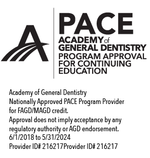 |
Thursday, May 9, 2019 7:30 p.m. CST Upper Night Guards Increase Bruxism, Sleep Apnea, Lock Jaw
Presented by Dr. Brock Rondeau |
Members: $75 Members' Staff: $75 Student Members: $37.50 Non-members: $125
Course Description:
The majority of the dental schools in North American have trained their dental graduates to fabricate night guards to help patients to stop bruxing at night. Clinicians know that this is not true since patients actually brux more with these night guards evidenced by the damage done to them by the occlusal forces on the teeth. These night guards have to be remade several times due to breakage due to traumatic occlusion. Another major problem is that these flat plane night guards encourage the lower jaw to fall back at night which increases the rate of snoring and degree of life threatening sleep apnea by over 40%. These night guard should never be used on a patient who shores or who has sleep apnea.
Patients with temporomandibular joint dysfunction (TMD) should not wear night guards. Any appliance that encourages the lower jaw to go back at night must be avoided. If the patient has a TMJ problem evidenced by the fact that their TM jaw joints click when they open and close then the flat plane upper or lower night guard must be avoided. I have had several patients whose jaws have locked painfully upon wearing a night guard.
Learning objectives:







